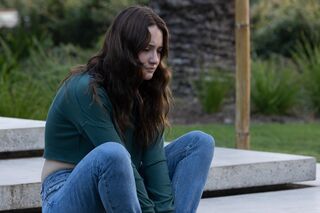Suicide
"Nine Perfect Strangers" and the Grief of a Child's Suicide
What happens when a family must grieve the loss of a child?
Posted August 28, 2021 Reviewed by Devon Frye
Key points
- A child’s death by suicide has a far reaching impact on many lives, as demonstrated in the show "Nine Perfect Strangers."
- Families are often afraid to reach out for help after the suicide due to the guilt and shame they feel.
- If the child was a twin, the remaining twin may feel they need to take care of their parents even if it means they suffer in silence.
- Grief is more complicated for a remaining twin as they also must search for a new identity.

In Liane Moriarty’s "Nine Perfect Strangers," an eight-part series on Hulu, nine people have signed up for a ten-day retreat at Tranquillum where they are promised to be transformed at the end of their stay. The strangers have come to escape their problems, to rest, relax and renew themselves. As you might imagine, with nine people, there are many different subplots about the characters and their lives. What struck me, however, was the depiction of the Marconi family, Heather, Napoleon, and Zoe. They have come to the retreat because of the death by suicide of Zach, their son and Zoe’s twin.
The Devastation Caused by a Suicide
One of the most devastating things that can happen to parents is the death of a child. The only thing that could make that even worse is when the child dies by suicide.
The portrayal of the Marconis helps us to better understand what a family experiences after a death by suicide. Even though three years have passed, the Marconis are still suffering from shock and disbelief.
This is certainly a timely topic as the rate of suicides in young adults has increased during the time of COVID-19. In addition, statistics indicate that suicide is the second leading cause of death among those aged 10 to 34 years.[1]
Initially, we see that it is difficult for the Marconis to absorb the reality of Zach’s death. For many, it can often take years to come to terms with the death and its impact on their individual lives and family dynamics.
Family members are often afraid to tell anyone about a suicide for fear of being judged and shamed. These families are already judging themselves and feeling shame and guilt without others adding to it. They will often not seek out professional help for fear of the shame and stigma that is attached to suicide. When asked about her brother, Zoe avoids mentioning suicide and says, “My brother stopped living three years ago the day before our 18th birthday.”
Survivors of Suicide and Traumatic Complicated Grief
We also see how the bereaved family ruminates and repeatedly relives the day of Zach’s death. Each member blames themselves for not having done more to have prevented it. They repeatedly say “if only I...” or “why didn’t I...” It is often easier to accept blame for what has happened rather than direct their anger toward the one who took their life.
Along with this is the seemingly never-ending question, “Why?” Sometimes individuals do not evidence any overt symptoms, or they were so subtle that no one recognized them. Many do not leave a note. The question of why may never be answered.
Families who have experienced the death of a child and especially if the death is by suicide generally suffer from traumatic complicated grief. This form of grief can be so long-lasting, intense, and severe that it can be extremely hard to recover. The Marconis display many of the symptoms that characterize traumatic complicated grief. They constantly think about Zach and his death and have trouble focusing on anything else. They are overwhelmed by intense emotions and unbearable grief. It is difficult for them to comprehend the finality of Zach’s death.
It is also not uncommon for family members to experience their own suicidal ideation at this time.[2] At one point in the show, Heather stands at the edge of a cliff. We see fear in the faces of those around her as it appears she is contemplating her own death before her husband stops her.
Twins and the Loss of Identity
Many times in families when a child has died by suicide, the remaining children often feel that they need to take care of their parents and not cause them any additional concern. This is certainly true of Zoe who keeps her thoughts and feelings from her parents.[3] Zoe tells people that she and Zach were not really close, as a way of minimizing her attachment to him. In this way, Zoe is able to protect and distance herself from having to talk about their relationship.
It is also a way to protect others from the true sadness and grief she experiences. We know that anytime a sibling dies, and especially if they were twins, the death can have a powerful impact on the survivor. Research has found that the remaining twin is at considerably greater risk of developing a psychiatric disorder, especially during the first few months after the death.[3] The loss of a twin is associated with greater grief than any other relative except for a spouse.[4]
The remaining twin's grief is further complicated by having to come to terms with their new identity. “Who am I now?” Having lived life as a “we,” they now must live life as an “I.” It is important that families and therapists be aware of this in order to help the bereaved twin.
Where To Find Help
For anyone who is experiencing grief from a child or twin suicide, while the pain may feel insurmountable, there is help. Just reach out for it. The following are some resources to consider:
- Twinless Twins Support Group International: www.twinlesstwins.org
- Helping Parents Heal: www.helpingparentsheal.org
- Compassionate Friends: www.compassionatefriends.org
- National Suicide Hotline: 1-800-273-8255 or www.suicidepreventionlifeline.org/help-yourself/loss-survivors
- American Foundation for Suicide Prevention: www.afsp.org
- To find help near you, visit the Psychology Today Therapy Directory.
References
2)Yasgur, Batya Swift (2018) Those left behind: Working with suicide-bereaved families
3) Song, Huan, Larsson, Henrik, Fang, Fang, Almqvist, Pederson, Nancy, Magnusson, and Valdimarsdottir, Unnur. (2020). Risk of psychiatric disorders among the surviving twin after a co-twin loss.elife 2020;9:e56860 DOI:10.7554/elife.56860
4) Segal, Nancy L (2009) Loss of a twin.
https://psychologytoday.com/us/blog/twofold/200907/loss-twin




